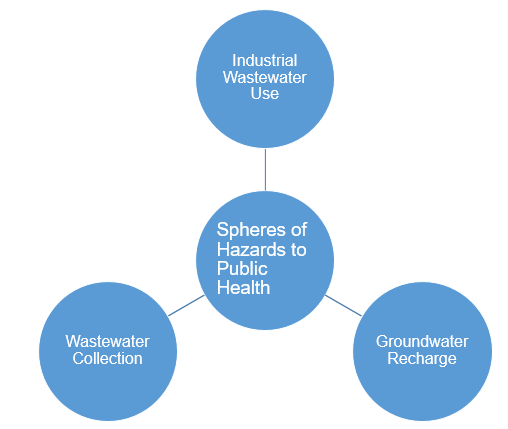Introduction
The U.A.E. as a rapidly developing society faces several water management challenges due to the growth in water demand. The water demand increases annually, which puts the country’s water infrastructure under significant pressure. Sewage treatment infrastructure must always keep up with the pace of the country’s development in the spheres of industry, agriculture, and social services.
Therefore, it is crucial that measures to deal with waste are compatible with other environmental initiatives (Environmental Agency – Abu Dhabi, 2016). Consequently, it is pivotal to take into account the full variety of issues related to the treatment of water, and to the potential dangers associated with the inappropriate treatment of sewage and industrial effluent, to avoid these dangers when creating and managing wastewater reuse or discharge systems. It is also important to keep in mind that sewage treatment infrastructure should be viewed as a part of the general environmental management system (Government of Dubai, 2014).
Industrial Wastewater Use for Agricultural Purposes
Industrial wastewater used for agricultural purposes can be dangerous if the transportation and treatment procedures are not followed properly. Even treated wastewaters sometimes fail to meet the standards provided by the World Health Organization (WHO) and the U.N. Food and Agriculture Organization (FAO; as cited in Sou, Mermoud, Yacouba, & Boivin, 2013). Poorly treated waters may lead to soil degradation and contamination of groundwaters (Shakir, Zahraw, & Al-Obaidy, 2017; Sou et al., 2013). Such types of contamination as increased salinity, excessive modification, and dangerous levels of chlorides in the soil are common (Shakir et al., 2017). This degrades the soil and has a negative impact on the health of the population.
Clearly, the type of contamination depends on what manner of a plant the water comes from. Also, the severity of contamination may depend upon the season in which wastewater is used for irrigation (Shakir et al., 2017). Therefore, to prevent these problems, it is paramount to follow all water treatment procedures, e.g., provided by WHO and FAO, and to take into account the seasonal factors (Shakir et al., 2017; Sou et al., 2013).
Issues of Wastewater Collection Infrastructure
The challenges related to wastewater collection are most severe in the segments of domestic effluents and industrial water reuse. For instance, poor treatment of domestic sewage is associated with infections, such as diarrheal diseases (e.g., cholera), malaria, and tuberculosis, and may cause considerably increased mortality rates in the population (Naik & Stenstrom, 2012). Improper collection and transportation of industrial effluents may cause ground contamination (Shakir et al., 2017). Inappropriate wastewater collection infrastructure may pose similar dangers if there are leaks of sewage, if the effluent is not treated properly, or if undesirable contact with wastewater occurs due to any other reasons.
Therefore, it is pivotal to ensure that water collection infrastructure is effective and efficient. No sewage should be discharged into the environment unless it has been treated according appropriately (Sou et al., 2013). The infrastructure for wastewater collection in urban areas should also be optimized to meet the needs of the growing urban population (Rehan, Knight, Unger, & Haas, 2014).
Groundwater Recharge Standards
The scarcity of groundwater reserves has long been one of the water management challenges the United Arab Emirates has had to face (United Arab Emirates Country Commercial Guide, 2016). Groundwater recharge standards can be violated in at least two ways. The first possibility is excessive water recharge, and the second is the recharge using wastewater of inappropriate quality. It is essential that in groundwater recharge, treated wastewater should be as close to drinking water standards as possible.
Otherwise, the water recharge may lead to groundwater contamination, making it potentially dangerous for public health (Shakir et al., 2017). In addition, the continuous percolation of irrigation water may cause a steady rise in groundwater levels, leading to the accumulation of salts and other undesirable issues if groundwater levels are not controlled, and appropriate treatment is not conducted.
Since groundwater as a source of freshwater has already been significantly exhausted during recent decades, it is essential to establish high standards of water refinement and strictly observe their implementation. In this case, it might potentially be possible to restore the safety of groundwaters to appropriate levels (Li et al., 2017).
Conclusion
Water has always been a crucial natural resource for many countries that have to face water management challenges. The effective management of the use of purified industrial water for irrigation, wastewater collection infrastructure, and groundwater recharge can significantly contribute to the safety of sewage treatment infrastructure operations. Attention should always be paid to meeting safety standards when treating wastewater and developing the named infrastructure. Negative impacts to public health arising from the operation of sewage treatment infrastructure are very likely unless strict rules concerning general safety measures when dealing with sewage treatment are developed and followed.

References
Environmental Agency – Abu Dhabi. (2016). Waste reuse, recycling, resource recovery, treatment, and disposal policy. Web.
Government of Dubai. (2014). Clean marina program – Dubai. Web.
Li, Z., Xu, C., Li, M., Yan, G., Liu, X., & Ma, Y. (2017). Identification and assessment of water safety risk for groundwater recharge with reclaimed water in China. Stochastic Environmental Research and Risk Assessment, 31(7), 1671-1682.
Naik, K. S., & Stenstrom, M. K. (2012). Evidence of the influence of wastewater treatment on improved public health. Water Science and Technology, 66(3), 644-652.
Rehan, R., Knight, M. A., Unger, A. J. A., & Haas, C. T. (2014). Financially sustainable management strategies for urban wastewater collection infrastructure – Development of a system dynamics model. Tunnelling and Underground Space Technology, 39, 116-129.
Shakir, E., Zahraw, Z., & Al-Obaidy, A. H. M. (2017). Environmental and health risks associated with reuse of wastewater for irrigation. Egyptian Journal of Petroleum, 26(1), 95-102.
Sou, M. Y., Mermoud, A., Yacouba, H., & Boivin, P. (2013). Impacts of irrigation with industrial treated wastewater on soil properties. Geoderma, 200, 31-39.
United Arab Emirates Country Commercial Guide. (2016). United Arab Emirates – Water. Web.